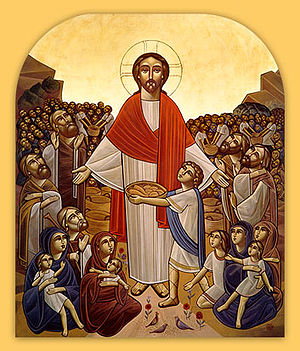
18th Sunday of the Year A
Readings: Isaiah 55:1‑3 Romans 8:35, 37‑39 Matthew 14:13‑21
In our capitalistic culture we tend not to value those things which are offered free of charge. Yet in today's readings God invites us to receive lasting nourishment “without paying and without cost.” As we listen to the proclamation of God's blessings through Jesus, let us sing in gratitude the refrain of our responsorial psalm: "The hand of the Lord feeds us;/ he answers all our needs" (Ps 145).
In the Isaiah reading the prophet speaks for God in inviting the thirsting and impoverished Babylonian exiles to come to God and receive the gifts that will sustain their lives: water, grain, wine, and milk. In a very practical way, the prophet reasons with them: "Why spend your money for what is not bread;/ your wages for what fails to satisfy?". The gift that God offers the exiles goes beyond mere material sustenance; our reading concludes with an invitation for the exiles to receive the fullness of life once promised to the dynasty of David whose descendant is to bring blessing to the world. “Come to me heedfully,/listen, that you may have life./ I will renew with you the everlasting covenant, the benefits assured to David.”
We have been reading Romans 8 for the past five Sundays; today's selection is the lyrical conclusion of that chapter in which Paul praises God for his all-powerful love manifested in Christ's death and resurrection. This act has so united us with Christ that no power can separate us from him: neither sufferings for the sake of the gospel (trial, distress, persecution, hunger, nakedness, danger or the sword) nor the heavenly and astrological powers of the universe who were gods in the paganism of the first century A.D. Christ has triumphed over all of these, and therefore, Paul concludes that nothing "will be able to separate us from the love of God that comes to us in Christ Jesus, our Lord."
In the episodes preceding Matthew's account of the multiplication of the loaves and fishes, Jesus is continuing to experience rejection and hostility. His native town of Nazareth could not accept his wisdom and mighty deeds because they knew him as "the carpenter's son" (13:54‑58). Also, Jesus has just been informed of the death of John the Baptist at the hands of Herod (14:1‑12) which leads him to withdraw "to a deserted place by himself." Despite his own precarious situation, Jesus' heart is "moved with pity" when he sees the vast throng that has followed him on foot from the towns.
The miracle of the loaves and fishes looks beyond a one-time feeding of a crowd in Galilee to the sustenance that Jesus will offer to the Church throughout the ages. This is evident in both the disciples' role and in Jesus' actions. The disciples are aware of the crowds' need for food and so they suggest to Jesus, “This is a deserted place and it is already late. Dismiss the crowds so that they may go to the villages and buy some food for themselves.” But Jesus does not want to disperse the crowd and therefore he tells the disciples, “There is no need for them to disperse. Give them something to eat yourselves.” Aware of their own paltry resources, the disciples reply, “We have nothing here but five loaves and a couple of fish.” This is all Jesus needs to feed the crowd. Through his life giving power, the five loaves and two fish are transformed into superabundant sustenance for the crowd so that "The fragments which remained, when gathered up, filled twelve baskets." The verbs used by Matthew in describing Jesus' actions would have Eucharistic connotations for Matthew's church and they still do for us. “He took the five loaves and two fish, looked up to heaven, blessed and broke them and gave the loaves to the disciples, who in turn gave them to the people.” When the Church attempts to fulfill its mission on its own human resources, it is powerless. Only in and through Jesus' power, still present in our Eucharistic celebrations, we as his disciples are able to satisfy the hunger of the crowd.
No comments:
Post a Comment